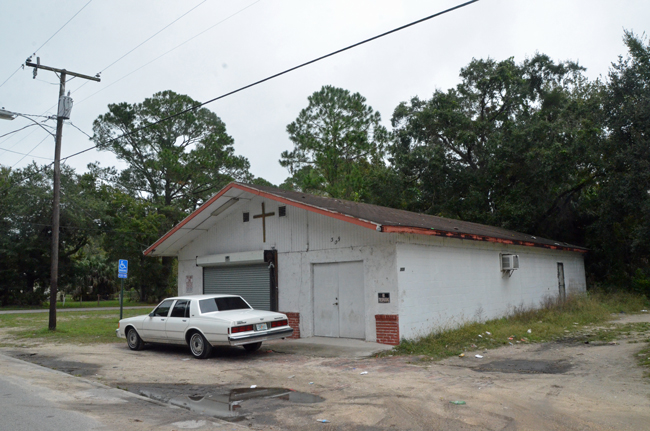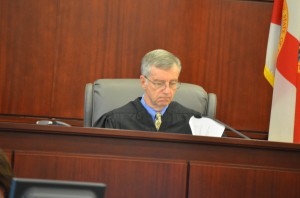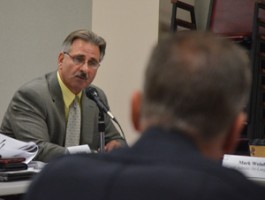
The Public Safety Coordinating Council—a collection of local police, court and other government agencies—voted with near unanimity on Wednesday to “support in any way we can” an evangelical Christian jail-diversion and recovery program for non-violent offenders that has yet to start operating within a former church on Bunnell’s Booe Street. The program would be privately funded, but its clients would be court-ordered into the program.
The council provided the endorsement sight unseen and legalities untested, and based exclusively on a brief presentation by Charles Silano, the local pastor and head of Grace Tabernacle Ministries and Grace Community Food Pantry who’ll also be the proposed recovery home’s unpaid CEO. Silano had conversations with Flagler County Sheriff Jim Manfre about the program. It was Manfre who made a motion for the council to officially endorse Silano’s program.
“I can’t think of an individual that I have more confidence in than Pastor Silano,” Nate McLaughlin, who chairs the county commission and the public safety council, said. “He has the strongest delicate hands I’ve ever seen. He has a way and he has follow through.”
The Organization Silano is heading is called Open Door Re-Entry and Recovery Ministry. It would be a non-profit (it’s applied for the designation). It would operate a residential 12-step recovery program for eight ex-convicts who would be court-ordered into the program, would be barred from leaving the home for the first three months but would get to take walks for a couple of hours in subsequent weeks, would have to complete the nine to 12-month program, and would have to hold jobs and pay their way at the house to the tune of $82 a week. How residents would pay in the early phases of the program, when they’re not allowed to leave the premise or hold a job, is unclear, as were a number of issues, among them the legality of a court ordering an individual into a sectarian program.
“This is probably an issue that would have to be better researched,” Flagler County Circuit Judge J. David Walsh, a member of the council, said. “Generally speaking the court relies upon the recommendations of the Department of Corrections. So I would be looking for them to make a recommendation as to alternative sentencing options. This may well be one of them. But I think before I as a judge would order this, I would want to have the Department of Corrections let me know if that’s an appropriate thing to do.”
If the inmate hasn’t tripped the 365-day incarceration period, below which the inmate would serve out a sentence at the local jail, Walsh said he would still want to hear recommendations “from others, be it the State Attorney’s Office, the counsel for the defense. I think that it would probably be not an appropriate thing for the court to order one to a particular program, be that this one or any other program.”

Silano said the recovery ministry would be faith-based, but it would certainly not preclude similar, secular programs—with which Silano said he’d be happy to work—nor would it force inmates into its evangelical framework: candidates would have to themselves be willing to go there. But the program would be offered as an alternative to jail—as an option between jail and the recovery house—as well as a recovery option, in a county where diversion and supervised recovery programs are few, making the choice a narrow one.
There is little question that recovery and diversion programs can be very effective to reduce the recidivism rate for ex-offenders, particularly sustained programs that monitor an individual’s follow-through and provide solid support on the way to reintegration in society. But courts have generally frowned on direct government involvement in such initiatives. A few years ago in Iowa a federal judge struck down a state-financed evangelical program designed to help ex-felons reintegrate society, calling it “pervasively sectarian.” The state court-ordered felons into that program. (The decision was upheld on appeal.)
Open Door is different in a crucial regard: it would have virtually no government funding. But it would still intersect with government through what Silano hopes to see as court orders, and through allowances by the local county jail for the ministry to go to the local jail at least twice a year and, essentially, minister and recruit.
How the program will run—with what funding, what operational support, what security measures and staffing—is not clear even after Silano’s outline.
The program is modeled after Friends of Sinners, a non-profit founded by Roger Chilton in 2009 in Owensboro, Ky., and whose president, Jim McBrayer, will be moving to Flagler to be the director of the Bunnell operation. The Kentucky operation currently has about 38 residents. According to its last-available filing in 2011, it had revenue totaling $224,000, including $62,000 from its clients and $162,000 in contributions and grants (of which $23,000 was contributed by churches and $21,000 by businesses). It had $160,000 in expenses, with a payroll of $70,000.
In contrast, Silano says the on-site supervisor at the house on Booe Street, an ex-convict himself, will be paid only $200 a month, and will be teamed with an “overseer” who will run the actual 12-step program. “Then everything else after that is pretty much discipleship groups, mature, elder capacity discipleship groups coming from various denominations in the county,” Silano said. The on-sire supervisor will be living at the site. How the supervisor and the overseer will on their own run the place seven days a week is unclear. Silano said volunteers will provide a lot of help, down to escorting clients to city hall or to the doctor’s.
The program’s completion rate in Kentucky was a little less than 40 percent. In 2011, after the program had been running two years, the organization noted in its tax filing that “thirty-one court-related residents have enrolled into our 18-month residential recovery program. To date, 12 residents have successfully completed a four-phase, 12-step program.”

The property, a 1900-square-foot, one-level, windowless concrete block building built in 1966, was at one point owned by the Islamic Center of Palm Coast, and sold in 2005 to Union City, N.J.-based Raloco Properties Corp. in 2005 for $94,000. The building was valued at $19,600 this year, according to the Flagler County property Appraiser. Silano said a donor to his program bought the building on behalf of his recovery ministry for about $21,600. That transaction has not yet made it through the property appraiser’s records. Silano would not say who the donor is.
The building is located in one of Flagler County’s poorest, most run-down and crime-ridden sections: South Bunnell, on a street that appears all too frequently as the location of arrests in police records. The building has been in disrepair for years. Upgrades are being donated. Silano says the ministry will help raise property values by occupying it with people the community will have no reason to worry about.
“They’re not walking around the neighborhood, it’s not a homeless shelter, it’s not something the community has to fear,” Silano said. “It will raise property prices because basically we’re not going into a posh neighborhood to have a rehab home, we’re going where the problem is.”
Those court-ordered into the program who violate the curriculum would be sent back to jail, Silano said. He described Open Door as just “one slice of the pie” in a recovery landscape that should eventually include other options. “There’s going to be a big pie here in the recovery landscape. We’re only one slice of it.” He added: “We unders5tand. We’re not trying to force religion on anybody. This is what we do. And the secular programs is what they do. We highly encourage the secular programs, because we all want the same thing. We want recovery.”
“You can’t force people to do anything,” Patricia Bryant, the administrator for the 7th Judicial Circuit, which includes Flagler, Volusia, Putnam and St. Johns counties, said. “We can recommend. Sometimes if they’re not amenable to it, it creates additional problems with supervision.”




























Nancy N. says
While I’m in favor of jail diversion programs, it is not acceptable to tell people they have the choice of only a religious program or jail. That’s not a constitutional choice. You shouldn’t have to choose between your personal beliefs and jail in a free society – even if you’ve committed a crime. I hope that the ACLU is all over this.
Also, frankly, having some experience via a family member in the operations of a similar facility for FL DOC inmates, I can tell you that there is no way people in that facility will succeed in their recovery with the facility located right in that neighborhood where they are surrounded by and have easy access to the very people and problems that got them there.
cynthia chambers says
I’m all for the self improvement of this men and women. I agree with Nancy. That location is setting them up for yet another failure in life. I wish them luck. Changing people, places, and things is the key to success. Not putting them right back in the same nieborhoods they came form in the first place.
A.S.F. says
Once, very early in my post-college career, I worked as a Probation Counselor for the first federally piloted drunk driving program in the country. I had a few Post Office employees on my client roster. I was having a difficult time tracking some of them down, even though they were supposedly participating in a special recovery program run by the Post Office itself. When I tried to contact the supervisor of that program, I had no better luck finding him than I had with many of my Probationers. When I did some further investigation, I found out that the Supervisor would often go out drinking with the Probationers during times when they were supposedly abstinent and in treatment or attending their in-house AA meetings. in fact, the supervisor in question was the one signing the Probationers’ attendance slips. I don’t know anything about the above mentioned program or the people involved with it and I certainly hope it works out as intended. But my experience is that such programs have to be monitored for compliance and adherence to treatment principles themselves or things can all too easily go wrong. By the way, AA and church attendance does not constitute actual treatment for people with serious addiction issues. They can be very helpful supports to formal treatment protocols but should not be considered as substitutes for the same.
Nancy N. says
Oh, and there’s no such thing as an EX-felon in the state of Florida. Once you are convicted of a felony in the state of Florida, you are subject to a lifetime restrictions, such as the requirement to register your whereabouts and a ban on gun ownership. Even restoring your civil rights can’t get you out of that.
Ray Thorne says
So which is it? This –>” The Organization Silano is heading is called Open Door Re-Entry and Recovery Ministry. It would be a non-profit (it’s applied for the designation). It would operate a residential 12-step recovery program for eight ex-convicts who would be court-ordered into the program, would be barred from leaving the home for the first three months but would get to take walks for a couple of hours in subsequent weeks,”
Or this –> ” “They’re not walking around the neighborhood, it’s not a homeless shelter, it’s not something the community has to fear,” Silano said.”
confidential says
I think that the try out of this program is something positive in this county and needed. Lets keep our hopes high that will work and be supportive other than negative from the start. I give plenty of credit to Pastor Silano for adding to his already very successful Food Pantry, this additional program. May save us a lot of money if successful by reducing jail population while recovering for society non violent felons.
I know a local successful business owner, that recovered from being a past felon and did it with the help of religious faith and his then, community support. Religion no matter the affiliation, helps to sooth a broken soul fallen into disgrace, is a fact!
Lets all give Pastor Silano a hand in his endeavor as he already has the support of many in the community including our current Sheriff.
Thank you Pastor Silano!.
Anon says
I’d bet it’s a done deal though I don’t know any of the parties involved. Clearly appears to be political. There’s money to be made in so-called ‘non-profits’. Silano appears to know the right people, and he’s pulling the right people together, taking a run down building, will no doubt apply for HUD money for improvements, other grant funding for counseling for decreasing recividism, will get endorsements in the form of MOU’s from the right people. And there’s federal grant money earmarked for faith-based organizations for both HUD, substance abuse treatment, jail diversion, AND homeless prevention. (Note, he made a point they are not homeless – yet.) Sounds like Silano has found a good niche.